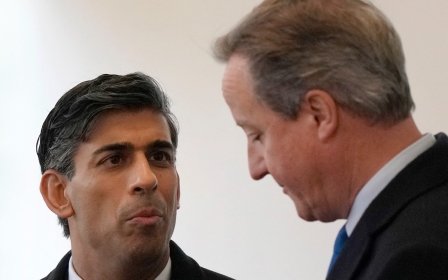Israel-Palestine war: Why British Muslims are losing faith in Starmer’s Labour

We are at an inflexion point in British politics, arising from the seven weeks of carnage in Gaza and the massive protests demanding a ceasefire since 7 October.
"This is a war on children," said Unicef 's James Elder from a hospital in Gaza on Friday, following the end of the truce between Israel and Hamas. "We cannot see more children with the wounds of war, with the burns, with the shrapnel littering their bodies, with the broken bones... Inaction by those with influence is allowing the killing of children."
For many Muslim voters in Britain, this period has been a terrible wake-up call, proof beyond all doubt that for the mainstream political and media class, no number of dead Palestinian civilians will stir them to call on Israel to stop its slaughter.
While Qatar was negotiating the complexities of a ceasefire, UK Prime Minister Rishi Sunak unequivocally backed Israel’s war, flying to Israel in October and telling Benjamin Netanyahu "we hope you win".
Labour also backed Israel’s war against Gaza, with its leader Keir Starmer making a series of statements in defence of Israel’s unprecedented bombing campaign and total siege, alleging that Israel has “the right to defend itself” and opposing ceasefire calls on the grounds that it would “freeze the conflict”.
Stay informed with MEE's newsletters
Sign up to get the latest alerts, insights and analysis, starting with Turkey Unpacked
In a speech at Chatham House on 31 October, Starmer explained why he opposed any cessation of violence at that point. By then at least 8,525 Palestinians had been killed in three weeks of relentless bombing by Israel following the Hamas-led attack.
By the time of the 24 November truce, the number of children dead and missing had reached 8,000, the very same number (of men and boys) killed at Srebrenica in the Bosnian Serb genocide of 1995. The overall death toll is more than 15,000, with 7,000 more missing, or one in 100 people in Gaza.
Israel's killing of 8,000 children was the price that Labour’s leadership inferred had to be paid to 'defeat Hamas'
This was the price that Labour’s leadership inferred had to be paid to “defeat Hamas”, an outcome that experts have said throughout the war was not realistic.
It was not a stance Starmer tried to say quietly. As Muhammad Jalal wrote on Islam21c last month: “For Keir Starmer, the backlash received from the Muslim community and the Labour Left only emboldens his obstinacy. He absolutely relishes where he is.”
When a vote for a ceasefire came, the majority of Labour MPs followed the leadership in opposing it, even including some who had said they backed a ceasefire.
Imran Hussain, MP for Bradford East, resigned from his ministerial position over the party's decision to not call for a ceasefire. In total 56 rebelled.
Labour's Israel apologists
In an interview with the BBC’s Victoria Derbyshire, Wes Streeting, Labour’s health spokesperson and close Starmer ally, justified Israel’s bombing campaign saying it had to be “acknowledged that for Israel this is fiendishly difficult because you’ve got Hamas that embeds itself in civilian populations, uses buildings like schools and hospitals as bunkers to hide within, that’s really difficult”.
This legitimising of Israeli targeting of hospitals and schools by claiming they are Hamas bunkers - now widely discredited by western media organisations - was used by Israel to systematically destroy Gaza’s hospitals, causing many deaths of patients and premature babies.
Streeting, who has a majority in his east London Ilford North constituency of 5,218, has faced protests outside his offices by local constituents, many were Muslims, horrified at his defence of Israel’s campaign.
Asked whether Israel had breached international humanitarian law by cutting off fuel and water supplies to 2.3 million people in Gaza, Labour’s Lisa Nandy, at one point a leader hopeful, refused to be drawn, instead saying: “I think this is an incredibly complex and fast-moving situation, there are 200 hostages, and Israel has the right to self-defence.”
On the BBC Radio 4 Today programme, shadow foreign secretary David Lammy said of Israel's repeated, devastating bombing of the Jabalia refugee camp that killed hundreds, that “if there is a military objective it can be legally justifiable”. He repeated the party line that “Israel has an absolute right to self-defence”.
Darren Jones MP, a Treasury frontbencher, was wheeled out repeatedly to defend Labour’s opposition to a ceasefire in the media. On 30 October he told ITV1 in a kind of fervent mantra that "Israel has the right to defend itself, has the right to recover hostages that are currently being held by terrorists in Gaza, has the right to defend itself from Hamas terrorists who continue to bombard Israel on a daily basis…” and blamed civilian deaths caused by Israeli bombing on Hamas.
Jones’ claim that the Israeli slaughter of civilians in Gaza was actually about rescuing hostages was barely credible, and later disproven when, three weeks later, after some 10,000 more deaths, a truce allowed hostages to be freed in exchange for the release of Palestinian prisoners of the occupation.
Labour's leader and the frontbenchers who have been out defending its pro-war stance are all members of Labour Friends of Israel, the party's Israel lobby group, and several have received major funding from pro-Israel donors, such as Trevor Chinn.
Rebellion
Not surprisingly, Labour’s stance on the war has caused the biggest outbreak of internal dissent since Starmer became leader in 2020.
There are, it should go without saying, many non-Muslim Labour members who are also horrified about the leadership’s public support - laced with a confected, meaningless concern - for Israel’s killing of thousands of Palestinian civilians.
Since the war started, Labour has lost control of three city councils due to resignations by its councillors - Oxford, Burnley and the latest, Norwich.
A Labour councillor I spoke to was reluctant to speak about Labour’s position on Gaza. He told me 'our hands are locked, we can’t speak'
A Labour councillor I spoke to was reluctant to speak about his party's position on Gaza.
He told me “our hands are locked, we can’t speak”, and referred to Labour’s support for humanitarian pauses. Another councillor said members should wait and things would “get better”.
But with Starmer imposing a tight grip across the party, the number of elected officials in the party who want to speak up - or quit - is growing.
In Newham, east London, Labour’s rock-solid hold on the area was overturned when a pro-Palestine candidate, Sophia Naqvi, a former Labour Party member, beat the party, which suffered a 39 percent drop in its vote. Labour won every council seat in Newham at the 2010, 2014 and 2018 council elections, but has now lost several.
Naqvi said: “I am a proud Muslim lady but my focus is on all communities and to represent people of all backgrounds; sadly Labour nationally no longer represents working-class people and our campaign has shown there is an alternative."
She joins other Newham Labour councillors who had already resigned over Labour’s Gaza stance and is amongst more than 60 nationally who have quit the party since the war began.

Last week, left-wing Labour MP Zarah Sultana described the abuse she had received as a Muslim female MP and the lack of support she had received from the Labour Party. She described Labour as institutionally Islamophobic and called for an independent inquiry into anti-Muslim racism in the party.
These kinds of problems may be dismissed by Labour HQ as it maintains a strong lead in national polls. A Labour insider reportedly described the slew of councillors quitting the party over Gaza as “shaking off the fleas”.
But there is every possibility that many Muslim voters are so alienated from Labour over Gaza that marginal seats across the country could be threatened in the 2024 general election, which could be held in May. One poll showed a dramatic drop in Muslim voters' support for Labour. Another pointed to Starmer's minus 26-point rating amongst Muslim voters.
Muslims make up 30 percent or more of the electorate in 20 constituencies according to the UK Parliament website. The Muslim Council of Britain created a list of marginal seats where Muslim votes could be decisive. Of 31 high- or medium-impact seats listed, all but one were Labour or Labour targets.
It's true, as Jalali points out, that most of the seats where Muslims form a large part of the electorate are safe Labour seats, and thus Starmer need not worry about losing Muslim votes, especially as the Conservative line on the war is the same: supporting Israel unconditionally. But longer term, Labour's stance on the war may come back to haunt the party.
Middle East Eye delivers independent and unrivalled coverage and analysis of the Middle East, North Africa and beyond. To learn more about republishing this content and the associated fees, please fill out this form. More about MEE can be found here.






